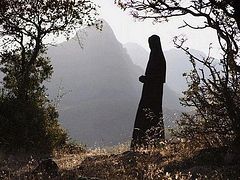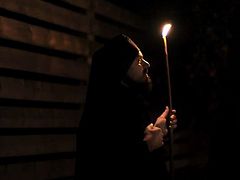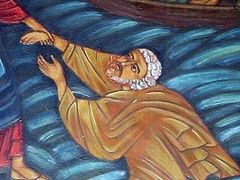Brethren, we are God’s fellow workers; you are God’s field, you are God’s building. According to the grace of God which was given to me, as a wise master builder I have laid the foundation, and another builds on it. But let each one take heed how he builds on it. For no other foundation can anyone lay than that which is laid, which is Jesus Christ. These are the words the Holy Apostle Paul addresses to us, today, the ninth Sunday after Pentecost, in his first Epistle to the Corinthians, in the third chapter. We, ourselves, the Apostle reminds us, are God’s field. It is the month of August and the harvest is upon us. As I saw yesterday, the corn was already harvested in certain fields; these fields were sowed with seeds and the produce was good and sufficient at the harvest. And it is the same with us: The word of God was sown in our souls and hearts, it was, and continues to be, nourished with the Holy Sacraments, and moreover, the Christian love and attentiveness we display towards each other and especially those who suffer and are less fortunate than us. So, when we heard these words today, at the Liturgy, did they resonate with us? Can we, in good conscience, say that our soul is a productive field for the Heavenly Kingdom? Can we, in good conscience, say that our Faith is growing and multiplying and bearing fruit in a spiritually productive manner?
Our Faith—whatever possible fruit is produced from within our soul, they are not our own. Only One is the Author and Perfecter of the Faith: Jesus Christ our Lord. No other foundation can be laid, except for Him. In the Holy Gospel appointed for this day (from Matthew, the fourteenth chapter) we hear about the Disciples who decided to fish at night on the Lake of Gennesaret. A fierce storm arose, and they feared the boat would capsize and their lives would be lost. Then, in the midst of the surrounding chaos, Jesus walked on the water to them and said: Be of good cheer! It is I; do not be afraid. The fears and anxieties we experience in this life exist because we do not have an innate recognition that Christ is the one who holds the checks and balances, and that without His express permission nothing can come upon us. Great things can occur when we trust in Him and accept His presence. Great things can occur when we recognize the truth that our existence is rooted in Him. Peter, when accepting in his heart and mind that Jesus was before him in the Sea, asked to walk and meet the Lord on the waters. Jesus invited Him to do so, and Peter accepted this invitation. Notice the request Peter made and the invitation the Lord issued: Peter requested to become a partaker of the Divine Nature. It is not for men to walk on water. Only the God-Man, the Creator and Lord of the material world can transfigure and bend the laws of nature.
Peter had only just begun to drown when he doubted the miracle he was living, when he doubted his own participation in the act of Christ which defied nature and logic.
Christ issues no less of an invitation to us. We are invited to become participants in the Divine Nature. This is the purpose of our Christian Faith. This participation—this vision into what we can truly become is displayed and exemplified in the Feast of the Lord’s Transfiguration, which the Orthodox Church recently celebrated on August 6/19, respectively. For those of us well acquainted with Church life, the story is familiar to us: Jesus took His three initiates which He held particularly close, Peter, James, and John, to the Mountain of Tabor and there He was Transfigured before them. What was this, exactly? The Gospel informs us it was a magnificent vision which they beheld in a half-woken state: During the Transfiguration, His face shone like the sun, and His clothes became as white as the light. And behold, Moses and Elijah appeared to them, talking with Him. Then Peter answered and said to Jesus, Lord, it is good for us to be here; if You wish, let us make here three tabernacles: one for You, one for Moses, and one for Elijah. While he was still speaking, behold, a bright cloud overshadowed them; and suddenly a voice came out of the cloud, saying, This is My beloved Son, in whom I am well pleased. Hear Him!
This is the Gospel account (from Matthew, the seventeenth chapter) of the Holy Transfiguration. Jesus revealed to the three Disciples the glory which He had with the Father before the world’s foundation. And it is this glory, this Kingdom and this Transfiguration we are called to participate in. The Lord says come to us—as He said to Peter in today’s Gospel. He invites us to participate in the work of building the Church in the world towards the glory of the Heavenly Kingdom. We should, albeit we unfortunately do not often, answer with the words the Apostle Peter uttered when he beheld Christ’s glory on Tabor: Lord, it is good for us to be here. Unfortunately, many of us prove useless and helpless in front of the invitation issued. Words like, but, why, and how are issued from us… and I say nothing of the infighting and frankly belligerent attitude which we often display towards each other in parish life. So, it is good for us to be here. It is good for us to bear one another’s Cross. It is good for us to be at this Liturgy, in communion with Christ and one another. It is good for us to take the love of Christ from this liturgy to our society.
And, it is good for us to be here, in this world, in 2021, during times which are unpredictable and anxiety-inducing.
Wherever we are, and whatever we are doing, we do so with Christ, so it is good for us to be here bearing the Cross and fighting on to God’s ultimate glory, remembering the following words from the Apostle Paul which end today’s Epistle: Do you not know that you are the temple of God and that the Spirit of God dwells in you? If we are God’s Temple, and if the Holy Spirit made His habitation in us through the Holy Sacraments, then it is our holy obligation to live a Christ-centered life here, each one at his or her own battle post. We are called to also be Transfigured towards the better, towards what is heavenly—we are called towards deification, that is, Theosis. Christ has placed us as His eyes and hands and feet in this world, in these times—right here. If anyone can complete the task it is we.
May the light of Christ’s Transfiguration shine when we interact with each other. May we give a hand to those in need of our help and attention. We are called to not live for ourselves, however, often the passions, our needs and fears and anxieties “block” us from achieving our maximum potential in Christ. In the Ninth Gospel reading in the Sunday Matins sequence, from John (chapter nine—read at the Matins today) the Lord enters into the room where the Disciples are locked away. Why are they locked away? From their living in fear and anxiety. Death is upon them. They fear that they, too, will meet the same fate as Christ. Peace be unto you, He addresses them. As the Father has sent me, so I send you. We are called to participation and Transfiguration; but we are also the ones sent forth into the world to reclaim some small corner for the Heavenly Kingdom. Let this ever-important and life-encompassing task be ever present before our eyes towards the building, edification, and enlargement of the Body of Christ, which is the Holy Church.





